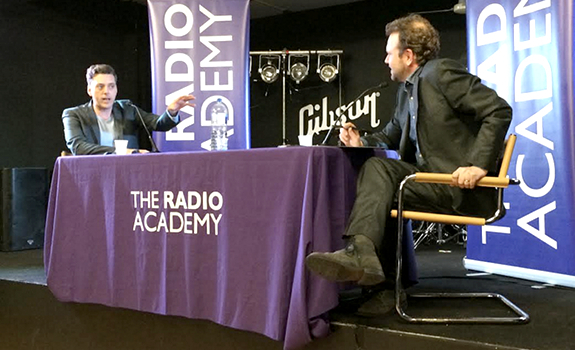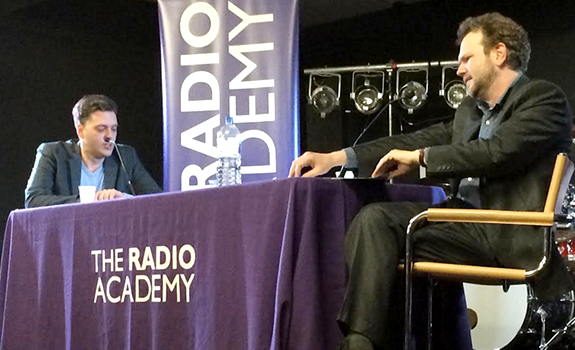Phone-ins are perfect to blend audience interaction and crowdsourced content into compelling radio, but how to avoid the pitfalls and get the best (out of your) on-air callers?
Social media hype or not, taking phone calls is still one of the best ways to communicate with listeners directly. Hearing great stories and engaging conversations keeps your audience engaged. The Radio Academy recently invited UK Talk radio personalities Iain Lee and James O’Brien to interview each other on the art of great phone-ins.
“I refuse to do ‘should we bring back hanging?’
or ‘should we legalize cannabis?’”

James O’Brien (right), here on stage with Iain Lee, rather avoids cheap phone-in topics (photo: Phil McGarvey)
Treat your audience respectfully
BBC Three Counties Radio morning show host Iain Lee feels like “it’s an odd job to go in and put yourself up on a parapet. You’re inviting people to come and have a go at you, if they think they’re hard enough.” LBC mid-morning personality James O’Brien used to boost his ego on air, for self-protection. “There was a pomposity – and there probably still is an unnecessary aggression – which is a result of the adrenaline and the fear. Sometimes it’s a fight-or-flight syndrome.” But he feels that “if someone’s having a pop at you, you don’t need to use the sledgehammer. In each year that’s passed, I have tried to be a little bit nicer – and the frightening bits of the job have diminished a bit.” He says that nowadays, his only fear is that nothing will happen. “I don’t really have anything between 10 and 1, except me and a microphone.”
 Make life your resource
Make life your resource
Lee used to do his show prep by scanning the newspapers for topics, until he learned an important lesson from Scott Solder, a colleague during his days at talk station LBC in London. “Scott said: don’t look at the papers, but come in and talk about what’s going on for you. It’s the best advice he could have given me. It helped me to kind of go off, and develop my own style – and take bits from Danny Baker and Tommy Boyd…”
Talk about relevant issues
Avoiding to talk about the news even became a trademark. However, his belief has now changed: “I’ve turned 40, I’ve got a mortgage, I’ve got 2 kids, and I started to realize that the act that I was doing wasn’t particularly sustainable.” Iain Lee’s breakfast show on BBC Three Counties Radio is different from what he did at LBC and Absolute Radio before. “We’ve got the balance of dicking around and having fun, but also talking about quite serious stuff.” There’s one key condition (“The thing that I can’t fake, is interest”) and he also finds it important to leave out topics that trigger much response without being original. I refuse to do ‘should we bring back hanging?’ or ‘should we legalize cannabis?’”
“Phone-in radio is
really, really bland at the moment”

BBC Three Counties Radio host Iain Lee would like to hear more personality talk in UK radio (photo: Absolute Radio)
Set higher caller standards
Many shows have regular callers. What to do with people who you don’t want to give a voice as you have heard them before and know where it’s going? James O’Brien tries to avoid people who love the sound of their own voice, but have absolutely nothing to say. “Even when you’re doing everything wrong and not making engaging radio, these nuts are still ringing in, in their droves. They are people that you don’t really want on the wireless… Other presenters often let them on, because they’re not getting any calls.” Iain Lee claims to not be afraid of silence anymore. His first show was a good training: “It was Christmas Eve, a 3-hour slot from 10 till 1 at night. We had 3 calls for 3 hours; it was a real baptism of fire.”
 Include several different views
Include several different views
James O’Brien thinks that a good presenter has a natural ability to maintain a balance of opinions in every show. If all callers would agree with a presenter’s opening statement or with each other, it’s time to look at things from the other side. In order to keep sounding credible (and not fake), his technique is to ask the ‘what if’ question to take the conversation in another direction, offering a new perspective and (make it look like) giving the opposite party a voice:
[audio:http://www.radioiloveit.com/wp-content/uploads/james-o-brien-radio-presenter-about-news-talk-radio-phone-ins-03.mp3|titles=James O’Brien about changing perspectives naturally]
Develop your own personality
3CR presenter Iain Lee is happy that he doesn’t always have to be completely impartial, even at the BBC. “If it comes down to a specific political thing, I kind of have to sit on the fence, which I struggle with. I find it really hard to bite my tongue if there’s something I feel strong about […] and I quite like that freshness!” He mentions Nick Abbot as someone who manages to still be exciting, different and even a little dangerous, but he’s on the air for quite some time. LBC’s James O’Brien feels like there’s not enough room for trial & error by new talent these days, especially in corporate organizations. Lee agrees that “phone-in radio is really, really bland at the moment. It has become homogenized, and there a too few companies owning too many stations. They all sound similar and a lot of the personality has gone out of radio.”
“Trust is quite a special thing,
and it’s worth aiming for”

James O’Brien (right) gets the best stories from listeners who get to trust him over time (photo: Phil McGarvey)
Temper your presenter ego
“The best callers take you by surprise”, James O’Brien says. “Part of this journey of trying to be a little bit less bumptious in the studio is not arriving at a conclusion about a caller after 30 seconds. You’ve got to give people a little bit of room – and, if they still get on your wick, sack them off immediately. My favorite callers are the ones that tell me something that I didn’t knew before.” Both presenters joke about racists and homophobes being among their ‘favorite’ callers as these deserve to get their butt kicked. O’Brien recalls interviewing someone that he found despicable. “I was bloody furious with that man. Ten minutes into the interview I realized that it was coming across. I do remember consciously thinking: you’re gonna’ loose your audience if you keep being horrible to him, so just sit on your anger and put him on a slow boil.” Iain Lee adds that doing the opposite of getting angry – being quiet – can work really well, too.
 Engage a broad listenership
Engage a broad listenership
Lee doesn’t want to make an average breakfast show with usual suspects like Beat the Intro or Battle of the Sexes. “There is a little bit more to it than that.” While trying to talk about meaningful topics, he tries to appeal to a broad radio audience, and build a bridge from recent to older generations. As a result, they will all feel like being connected to the show. “The kids can dig it, the 20-30 year-olds can get it, but older people can kind-of get it as well.”
Win your audience’s trust
James O’Brien explains that a good presenter can make listeners share personal stories when he his being trusted. “It’s not that difficult to get someone to tell you something intimate, but the people who trust you wouldn’t tell anyone. When I hear other, fresher presenters thinking they’ve got a call, I do find myself registering that I have heard that story 3 times, with 3 different presenters. It’s like calls that begin with: ‘My child is autistic’. I often find that this is someone who is not going to tell you something interesting – as it’s not the first thing you would mention in any context. There’s a magic of sincerity and originality that you can’t fake.” Having this sixth sense as a presenter cannot be learned in a few years; it’s developed over a long radio career. “Trust is quite a special thing, and it’s worth aiming for.”
“The people who hate you the most,
are those who listen to you the most”

LBC radio host James O’Brien confirms the key takeaway from Howard Stern’s movie Private Parts (photo: LBC)
Go for personal stories
Iain Lee has learned that everyone in your audience has a story, if you push the right buttons during a conversation. He’s also experienced that people can change. Even a hostile caller may turn around over time, and suddenly share his most personal thoughts and feelings with a presenter:
[audio:http://www.radioiloveit.com/wp-content/uploads/iain-lee-radio-presenter-about-news-talk-radio-phone-ins-01.mp3|titles=Iain Lee recalls impressive listener stories]James O’Brien experienced that everyone in the radio business looks down on phone-in radio, because they don’t understand the potential impact of using it for powerful storytelling:
[audio:http://www.radioiloveit.com/wp-content/uploads/james-o-brien-radio-presenter-about-news-talk-radio-phone-ins-01.mp3|titles= James O’Brien explains radio’s phone-in potential]
 Protect callers against themselves
Protect callers against themselves
Especially at night, there are strange people among phone-in callers. Where is the line between having legitimate fun with someone who is a bit eccentric and exploiting someone who might have a real mental problem? “If they are damaged goods, I don’t go for the soft target”, Lee says. It’s happened that he had fun with a caller, only to notice after a while that this person was not completely there. “I’ve politely stepped back.”
Entertain not only friends
Someone in the audience addresses the psychology of callers with (extremely) different beliefs than the presenter. Why do they listen and phone in, sometimes every day? O’Brien: “There are presenters I really admire, and understand the appeal of, who have politics that I find repugnant.” The conclusion is that great presenters happen to be good company for every listener. “Oddly, the people who hate you the most, are those who listen to you the most” [see What You Can Learn From Howard Stern]. “The ones who say: ‘I never listen to that lefty James O’Brien, he’s absolutely disgusting and never lets a caller get a word in, for example: at 11.37 on Tuesday; 12.04 on Wednesday; 10.17 on Monday…’ That’s the kind of person who’s boycotting me that I can live with.”





Add Your Comment